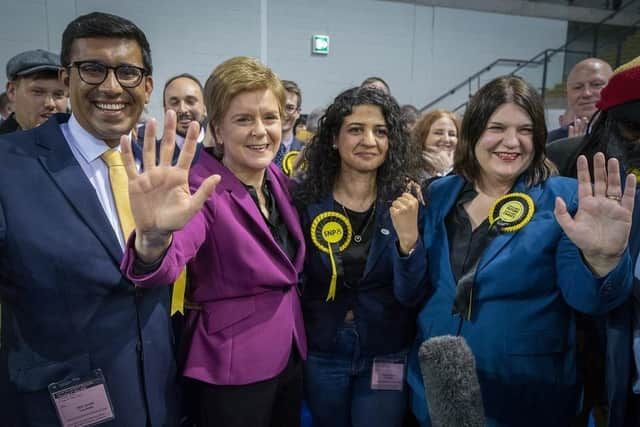Local elections 2022: Which party truly won and what the fallout could be from voting results
Polling conducted since the turn of the year has pointed to Labour catching and then overtaking the Conservatives, laying claim to once again becoming Scotland’s second force and the largest pro-union party, a change in the political landscape that may have a profound impact on any forthcoming independence referendum campaign.
And so it transpired, leaving Scottish Labour leader Anas Sarwar the opportunity to claim that Labour is “back on the pitch”.


Advertisement
Hide AdAdvertisement
Hide AdBut though this may be the most eye-catching story, the result actually highlights a very familiar theme, that the SNP remains Scotland’s dominant party, meaning Labour’s revival has come primarily at the hands of the Conservatives.
The overall results paint the picture.
The SNP won 34 per cent of the first preference votes recorded under the Single Transferable Vote (STV) system that is used in Scottish council elections, an improvement of 2 percentage points on its performance in 2017. This means the party now has 451 councillors across, an increase of 24.
Labour came a clear second, winning 22 per cent of first preferences (up two points) and 212 councillors (a net gain of 18 councillors), while the election’s clear losers were the Conservatives, falling by six points to 19 per cent and meaning makes a net loss of 61 councillors, with 212 now across Scotland.
The Scottish Greens and Liberal Democrats can also claim some notable successes, the former almost doubling its representation at local level with 34 councillors, and the latter adding 20 councillors to now stand at 84 across the country.
While the results provide a mixture of reassurance and cheer for four of Scotland’s five main parties, there will be somewhat of a wake at Scottish Conservative HQ, after the party’s worst result since it emerged as Scotland’s second party in 2017.
The fact the results look particularly bad because they are compared with the 2017 election, which was a high point for the party, will provide little comfort to the Scottish Conservatives. Having secured an increased share of seats at last year’s Holyrood election, this will be a particularly difficult defeat for the party.
Taking a close look at polling over the past 12 months, the party’s fortunes began to slide at the turn of the year, with each poll conducted in 2022 showing them trailing Labour. This, of course, leaves the inevitable conclusion the ‘Partygate’ impact seen in results across Britain this week has also had a significant impact to the party’s performance in Scotland.
Conservative leader Douglas Ross has certainly cited this ongoing saga as making the decisive difference in the party’s fortunes. But it is clear other senior figures in the party, including former MSP Adam Tomkins, also lay part of the blame at Mr Ross’s door, blaming the leader’s ‘U-turn’ over his support for the Prime Minister as being a key factor in its loses. This gives the party a big headache over future strategy in terms of relations with the UK party and whether or not it reconsiders its stance on the position of Boris Johnson.
Advertisement
Hide AdAdvertisement
Hide AdLabour will be buoyed by these election results and will rightly claim to be back as the second party in Scotland after many years of continued decline. It will point to a significant victory in West Dunbartonshire where it now has overall control as well as gains across the country, including in Glasgow.
It is clear though the party’s gains have come primarily at the expense of the Conservatives, with no significant blow landed on the SNP, leaving the conclusion this is largely a matter of votes moving between Scotland’s two main pro-union parties.
For the SNP, the results can probably be most accurately described as steady rather than spectacular. In the positive column, the party gained a higher share of first preference votes than in 2017, won Dundee Council outright, held off a resurgent Labour in Glasgow to remain the largest party and comfortably retained its position as the largest party in the Scottish capital.
After 15 years in power these are significant achievements which should not be understated. However, the party may be a little disappointed not to have increased its first preference vote share by more than two points.
This may be part due to the positive performance from the Scottish Greens whose increase in first preference shares to 6 per cent may have impacted somewhat on the SNP’s first preference share. This means that pro-independence parties scored around 40 per cent of first vote preferences, compared to pro-union parties scoring around 50 per cent, with 10 per cent voting for local independent candidates.
As the dust settles on this vote, the constitutional fallout lies in Labour re-emerging in second place and what that might mean for a pro-union campaign in any future independence referendum. The pro-independence parties, particularly the SNP, will maintain there is a mandate for such a referendum and that this election reinforces that mandate.
The focus for the immediate future of the UK is likely to turn to Northern Ireland as Sinn Fein’s victory there may make the prospect of a Border Poll on Irish reunification more likely. Given the significant losses suffered by the Conservatives across all parts of the UK in this election, this will be yet another tricky issue for a beleaguered Prime Minister to grapple with.
- Mark Diffley is the founder and director of Scottish research group Diffley Partnership.
Comments
Want to join the conversation? Please or to comment on this article.